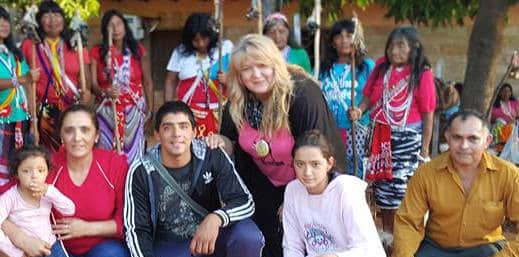In her many years working with the Maká tribe in Paraguay, Brigitte Fuzellier became known as the “Tiger Lady” – or Qametenheki in the native language. The local chief bestowed her with the name because of her tenacity. He honored her further when he was on his deathbed, two years ago.
“He called me to the hospital when he was dying. He wanted to see me one last time,” Fuzellier recalls. “He held my hand very strong, and he made a painting in the air.”
Fuzellier says she never knew what the chief drew or what his painting meant, but she knew well enough that it was a profound gesture. “The tribe kind of adopted me.”
Hundreds of Maká men and women worked with Fuzellier in a remote area of Paraguay, harvesting the indigenous luffa plant and making natural body sponges for sale around the world. It was a thriving, sustainable business until the German charity she worked for began a decade-long retaliation campaign against her, sapping her of nearly everything.
It was 2010 and Fuzellier, originally from Germany, was running the Paraguayan operations of Kolping International. Based in Cologne, the large Catholic charity has close ties to former Chancellor Angela Merkel’s Christian Democratic party. After Fuzellier reported widespread misconduct and degeneracy, which forced a publicly embarrassed Kolping to repay grant funds, the charity exacted revenge. The reprisals included dismissal from her position, smearing her reputation, filing a series of dubious criminal charges, and using questionable legal tactics to limit her ability to travel. She even was banned from visiting her grandchildren in Germany.
It was not until June 2021 – 11 years after the ordeal began – that Paraguay’s Supreme Court threw out the last of the retaliatory criminal charges Kolping had initiated against her. Now, Fuzellier wants Kolping to pay back what she has lost.
‘They Cannot Escape’
Fuzellier is pursuing five legal actions: an unfair dismissal case against Kolping in labor court, perjury and defamation complaints against two former high-ranking Kolping executives, and personal injury cases against Kolping and the Paraguayan government. Kolping lost its latest motion in the labor case, she said, which may soon be heading to trial.
“They cannot escape. They will have to pay,” says Fuzellier. “I lost five houses. I lost my company. My native farmers lost everything. You can easily count $2-3 million in property that I have lost and $1 million in orders for my luffa company. I was successful, and then everything was destroyed.”
Kolping has not responded to several requests for comment on Fuzellier’s case.
An ironic twist of fate may work to Fuzellier’s advantage. After her last home was repossessed recently, it was purchased by a law firm that wanted to use it for an office. When she told the lawyers about her plight, they not only agreed to allow Fuzellier to continue to use part of the house – including to maintain her animal sanctuary – they also stepped to provide legal assistance in her court cases.
“If I get reimbursed, I will work again with the native farmers. I will not let the loofa project die,” she said. “I believe that when you find out something that is not correct, and you are right about something, you should not get punished. This is not what I learned from my parents.”
“There needs to be justice,” she said, “especially for the small farmers, the families, the Maká people.”
A Profitable Non-Profit
Kolping was founded in 1850 by Father Adolph Kolping, a beatified Catholic priest who spent decades building dozens of non-profit “Kolping Houses” for itinerant workers. Over the past few decades, as the Berlin Spectator reported last year, Kolping and its hundreds of affiliates have built a global business enterprise.
Supported by massive public funding from the German government, Kolping has constructed webs of intertwined for-profit and non-profit companies. These money-making enterprises include upscale hotels and resorts in many countries, some of which were converted from former Kolping Houses. Other for-profit companies – including consulting firms, a coffee company, a publishing company, and various service providers with vague mandates – have amassed millions of euros in profit reserves over many years.
The European whistleblower advocates have requested that German lawmakers and officials examine Kolping’s finances. The German Ministry for Economic Cooperation and Development (BMZ) cut Kolping’s funding by 16 percent from 2019 to 2020. This reduction came shortly after Kolping’s questionable financial practices were revealed. Still, the BMZ has given €81 million in taxpayer funds to Kolping from 2010 to 2021, the charity’s annual reports show.
